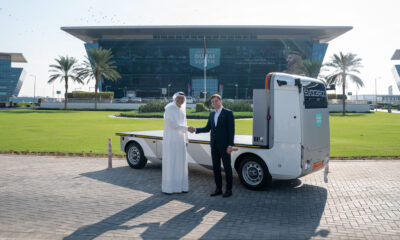News
Saudi Arabia And UAE Join The Global Rush For AI Dominance
As operational expenses for AI soar, the race is on to purchase as many high-performance Nvidia chips as possible.

The United Arab Emirates and Saudi Arabia are now part of the global race to buy up thousands of Nvidia A100 and H100 chips, two of the company’s high-performance processors, due to their pivotal role in Generative Artificial Intelligence (GenAI) development.
The Nvidia H100 chip, with a massive price tag of $40,000, is the world’s first processor designed specifically for GenAI. Saudi Arabia already has a stash of over 3,000 of the chips at the King Abdullah University of Science and Technology (KAUST). Meanwhile, the UAE has access to thousands of Nvidia processors and has even developed a unique large language model, known as Falcon, at the Technology Innovation Institute.
The ongoing global chip shortage is contributing to the scarcity and pricing of the processors, and the total cost for server infrastructure is expected to exceed $76 billion by 2028. OpenAI, the leading player in the field, currently runs ChatGPT on a cloud infrastructure costing millions of dollars per day to run. At the same time, the massive amounts of computing power required by these AI systems is also responsible for driving up energy consumption and other related expenses.
Also Read: Dubai Community Launches AI-Powered Pedestrian Crossings
The global scramble for high-performance Nvidia chips reflects AI’s pivotal role in shaping modern, digital-first economies. The ambitions of Saudi Arabia and the UAE to play leading roles in AI development come at significant financial costs and underscore the need for highly efficient computing methods. The development of AI involves not only scientific innovation but also careful attention to the ethical and environmental implications of the technology.
One thing is for sure: As the AI arms race gathers pace, striking a balance between technological advancement and social and environmental responsibility will become paramount.
News
Mamo Completes $3.4M Funding Round To Enhance Fintech Services
The startup will use the influx of cash to expand into Saudi Arabia and across the wider GCC while improving its product offering.

UAE-based fintech Mamo has announced the completion of a $3.4 million funding round that will help the startup extend its market presence and improve its product offering. Investors included 4DX Ventures, the Dubai Future District Fund and Cyfr Capital.
Mamo’s platform offers “payment collection, corporate cards and expense management” to help small and medium-sized businesses consolidate and streamline their operations. With the latest influx of capital, Mamo will further develop its comprehensive suite of services and begin testing its product lines in Saudi Arabia, further extending its footprint across the GCC.
Imad Gharazeddine, co-founder and CEO of Mamo, stated: “We’ve been in the market for a while now and are incredibly proud of what our team has achieved. The holistic and expansive nature of our product offering has helped us continue to grow sustainably. This additional funding will allow us to reach our medium-term goals even faster. The support from new and existing investors is a testament to our strong expertise and the ability to deliver on our customer promise”.
Daniel Marlo, General Partner of lead investor 4DX Ventures, added: “We have immense trust in Imad’s vision, leadership and Mamo’s innovative approach to provide a user-friendly and comprehensive financial solution for SMEs that makes financial management more accessible and efficient. We are proud to partner with them and support their mission”.
Also Read: A Guide To Digital Payment Methods In The Middle East
Amer Fatayer, Managing Director of Dubai Future District Fund’s investment team, also commented: “Mamo’s localized product lines serve as an infrastructure for SME payments and spend management in UAE, a segment that is underserved by the country’s current banking infrastructure. The team has taken a product-first approach to consolidating SMEs’ financial journeys and building a fintech solution deeply embedded in a business’s core operations”.
To date, Mamo has raised around $13 million in investment funding and now boasts a team of 30 people. The company’s intuitive financial services platform has allowed over 1,000 businesses to consolidate their financial operations and significantly reduce payment fees.
-

 News4 weeks ago
News4 weeks agoAmazon Prime Day 2024: Get Ready For 6 Days Of Amazing Deals
-

 News4 weeks ago
News4 weeks agoSamsung Unpacked 2024: What To Expect From The July 10 Event
-

 News4 weeks ago
News4 weeks agoCoursera Report Shows Surge In UAE Interest In AI Upskilling
-

 News4 weeks ago
News4 weeks agoMeet Dubai’s Groundbreaking Smart Robot Delivery Assistant















